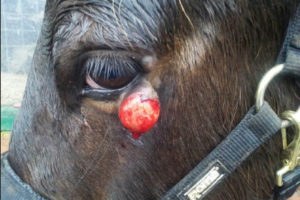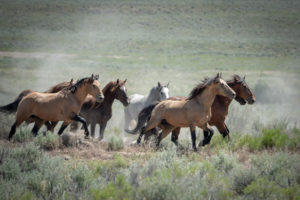Latest News – The Horse

Preparing for Natural Disasters With Horses: Do’s and Don’ts
Identifying risks and reducing and mitigating a disaster’s effects start with a well-written, all-hazards plan for sheltering in place and/or evacuating. Here are some keys to remember.

Facts About Sarcoids in Horses
Sarcoids are believed to be the most common equine skin tumor, affecting about 2% of the worldwide population. Here’s what you need to know about these potentially problematic skin growths.

How to Protect Your Horse From Equine Influenza
Equine influenza virus activity has increased in the U.S. and Europe recently. Here’s what you can do to protect your horse.

BLM Idaho Hosting Hearing on Vehicle Use in Wild Horse Management
The hearing will take place April 18 from 3-5 p.m., local time, at the Marsing American Legion Community Hall, located at 126 S. Second Ave. in Marsing, Idaho.

EHV-1 in Nevada: Three More Horses Test Positive
Two horses that attended the NRCHA Stallion Stakes, which took place March 30-April 6 in Las Vegas, tested positive for EHV-1. Additionally, an unrelated case was diagnosed in a Clark County horse with neurologic signs.

Am I Feeding My Horse Right?
An independent equine nutritionist answers horse owner questions on forage, feed concentrates, fats, supplements, and more.

How Will Brexit Impact British, European Horses?
Horses are likely to experience delays and be refused at border checkpoints during transport, which could compromise health and welfare and economically impact owners, trainers, and brokers, industry experts say.

How to Inventory and Insure Your Horse Tack
Tack and other horse supplies aren’t cheap, but there are ways to protect your investments. Insurance agents familiar with the horse industry share their tips.

EHV-1 in Ontario: Two Cases Confirmed
An affected gelding at a facility with both competition and resident horses in the Regional Municipality of York was euthanized after developing severe neurologic signs. The second horse, which had been stabled at the Municipality of York facility prior to returning to the District of Cochrane, also tested positive.

EHM in Texas: Case Diagnosed in Montgomery County Horse
The positive horse attended a reining event in Ardmore, Oklahoma, the week of March 18. Since that competition, the horse has not traveled to any other event and is under the care of a Brazos County veterinary hospital.

Dealing With Enthusiastic Equine Learners
Learn how to modify an overzealous carrot stretcher’s behavior.

International Equine Disease Report, Fourth Quarter 2018
Reported diseases included African horse sickness, atypical myopathy, contagious equine metritis, salmonellosis, and more.

WCVM to Pay Necropsy Fees on WFFS Cases
The University of Saskatchewan’s Western College of Veterinary Medicine will cover the fee associated with the necropsy of aborted fetuses, stillbirths, or euthanized foals suspected of having Warmblood fragile foal syndrome to gather additional information about the genetic disease.

Assateague Wild Horses: March 2019 Census Complete
The total population of the Maryland herd is currently 76 horses (21 stallions and 55 mares).

Tying-Up in Horses: Where Do We Stand?
Experts share information about the steps needed to identify PSSM, how to distinguish between the types, and recommendations for managing affected horses.

Dr. Corrine Sweeney to Lead ARCI
Corrine Sweeney, DVM, is one of the authors of the American College of Veterinary Internal Medicine’s 2014 consensus statement on exercise-induced pulmonary hemorrhage in horses.











